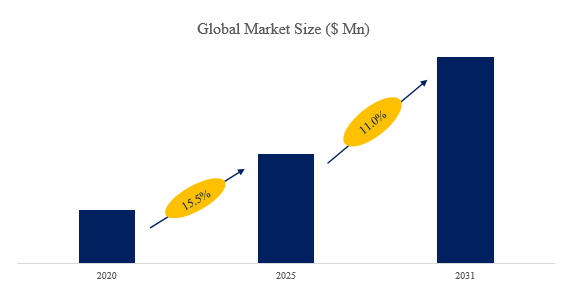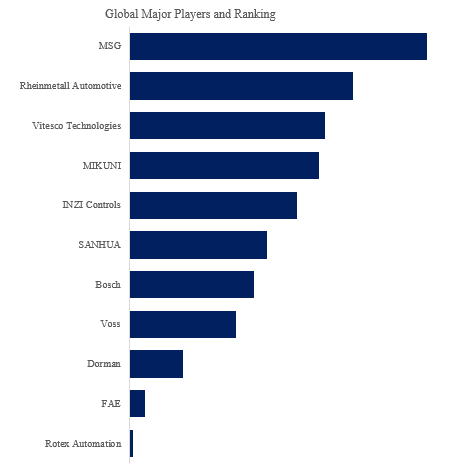Coolant control valves are essential components in automotive engine cooling systems. They regulate the flow of coolant to maintain the engine within an optimal operating temperature range. By precisely controlling the coolant flow, these valves prevent the engine from overheating or becoming too cool, ensuring efficient engine operation and prolonging its service life. These valves are typically installed in the engine’s cooling system and come in various types based on the number of ports, with 2-way, 3-way, and other types being common.
According to the new market research report “Coolant Control Valves – Global Market Share and Ranking, Overall Sales and Demand Forecast 2025-2031”, published by QYResearch, the global Coolant Control Valves market size is projected to reach USD 0.57 billion by 2031, at a CAGR of 11.0% during the forecast period.
Figure. Global Coolant Control Valves Market Size (US$ Million), 2020-2031

Source: QYResearch, “Coolant Control Valves – Global Market Share and Ranking, Overall Sales and Demand Forecast 2025-2031”
Figure. Global Coolant Control Valves Top 11 Players Ranking and Market Share (Ranking is based on the revenue of 2024, continually updated)

Source: QYResearch, “Coolant Control Valves – Global Market Share and Ranking, Overall Sales and Demand Forecast 2025-2031”
According to QYResearch Top Players Research Center, the global key manufacturers of Coolant Control Valves include MSG, Rheinmetall Automotive, Vitesco Technologies, MIKUNI, INZI Controls, SANHUA, Bosch, Voss, Dorman, FAE, etc. In 2024, the global top five players had a share approximately 52.0% in terms of revenue.
In terms of product type, currently 3-way coolant control valves hold a larger market share, accounting for approximately 63.1% of the global market.
Market Driving Factors
Increased Environmental Regulations and Emission Standards
With the growing environmental concerns globally, stricter emission regulations have been implemented, especially in the automotive industry. As automakers strive to meet these emission standards, there is an increasing demand for efficient cooling systems. Coolant control valves, being a key component of automotive cooling systems, help improve engine performance, minimize temperature fluctuations, and assist in meeting the stringent emission requirements.
Rapid Growth of Electric and Hybrid Vehicles
The rise of Electric Vehicles (EVs) and Hybrid Electric Vehicles (HEVs) has significantly impacted the coolant control valve market. Compared to traditional internal combustion engine vehicles, EVs and HEVs have more complex cooling system requirements, particularly in terms of battery and motor cooling. As a result, coolant control valves play an increasingly important role in these new types of vehicles, driving the demand for the market.
Increased Focus on Automotive Lightweighting and Energy Efficiency
Automakers are increasingly focusing on reducing vehicle weight to improve fuel efficiency and reduce carbon emissions. Coolant control valves help optimize coolant flow, ensuring that the engine operates within the optimal temperature range, which in turn improves fuel efficiency and reduces energy consumption. This makes coolant control valves an important tool for promoting vehicle lightweighting and enhancing energy efficiency.
Market Restraints
High Production Costs and Technical Demands
The production of coolant control valves requires high-precision design and manufacturing processes, as well as the use of high-quality materials, making production costs relatively high. High-performance coolant control valves, in particular, may require advanced materials and more complex manufacturing techniques, which increases costs. This can pose a barrier to entry for smaller manufacturers.
Fluctuating Raw Material Prices
The production of coolant control valves involves various metal materials such as aluminum, copper, and steel, as well as high-performance plastics. Fluctuations in the prices of raw materials can directly impact production costs, which in turn can affect the market prices of coolant control valves. Significant increases in raw material costs could make it difficult for manufacturers to maintain cost control and impact their market competitiveness.
Intense Market Competition
The coolant control valve market is highly competitive, with numerous players entering the field and launching similar products. This has led to product homogeneity and fierce price competition, forcing manufacturers to constantly improve product quality and reduce production costs in order to maintain market share. This competitive pressure could pose a significant challenge for companies with weaker technical or financial resources.
Limited Consumer Acceptance of New Technologies
Although new technologies, such as smart coolant control valves, are gradually emerging in the market, consumer acceptance of these innovations remains limited, particularly in developing countries. Consumers may have concerns about the complexity and higher cost of new technologies, which can reduce the market penetration rate of these products.
About The Authors
Li Feifei – Lead Author
Email: lifeifei@qyresearch.com
Li Feifei is a technology & market senior analyst specializing in environmental chemical and mechanical equipment. Li has 9 years’ experience in semiconductor and focuses Coolant Control Valves , marine exhaust gas cleaning systems (marine scrubbers/EGCS), direct air capture (DAC or DACCS), spectrometers, road sweepers and other environmental sanitation equipment, gear grinding, bearings, lithography machines, Coolant Control Valves s, etc. She is engaged in the development of technology and market reports and is also involved in custom projects.
About QYResearch
QYResearch founded in California, USA in 2007.It is a leading global market research and consulting company. With over 17 years’ experience and professional research team in various cities over the world QY Research focuses on management consulting, database and seminar services, IPO consulting, industry chain research and customized research to help our clients in providing non-linear revenue model and make them successful. We are globally recognized for our expansive portfolio of services, good corporate citizenship, and our strong commitment to sustainability. Up to now, we have cooperated with more than 60,000 clients across five continents. Let’s work closely with you and build a bold and better future.
QYResearch is a world-renowned large-scale consulting company. The industry covers various high-tech industry chain market segments, spanning the semiconductor industry chain (semiconductor equipment and parts, semiconductor materials, ICs, Foundry, packaging and testing, discrete devices, sensors, optoelectronic devices), photovoltaic industry chain (equipment, cells, modules, auxiliary material brackets, inverters, power station terminals), new energy automobile industry chain (batteries and materials, auto parts, batteries, motors, electronic control, automotive semiconductors, etc.), communication industry chain (communication system equipment, terminal equipment, electronic components, RF front-end, optical modules, 4G/5G/6G, broadband, IoT, digital economy, AI), advanced materials industry Chain (metal materials, polymer materials, ceramic materials, nano materials, etc.), machinery manufacturing industry chain (CNC machine tools, construction machinery, electrical machinery, 3C automation, industrial robots, lasers, industrial control, drones), food, beverages and pharmaceuticals, medical equipment, agriculture, etc.
Contact Us:
If you have any queries regarding this report or if you would like further information, please contact us:
QY Research Inc.
Add: 17890 Castleton Street Suite 369 City of Industry CA 91748 United States
E-mail: global@qyresearch.com
Tel: 001-626-842-1666(US) 0086-133 1872 9947(CN)
EN: https://www.qyresearch.com
JP: https://www.qyresearch.co.jp
